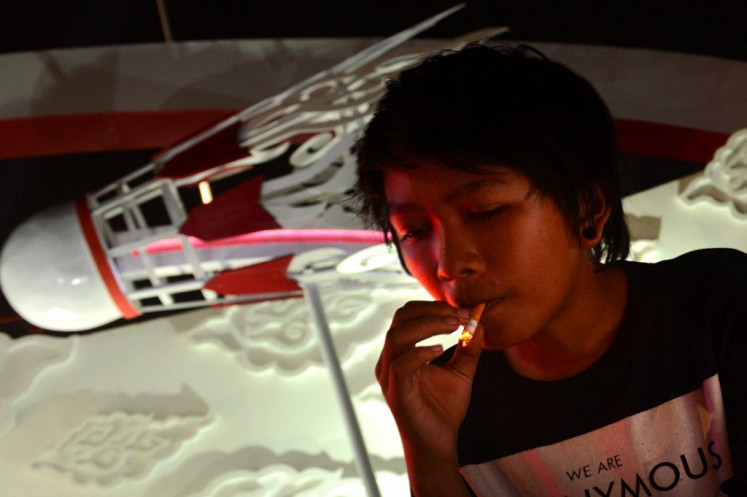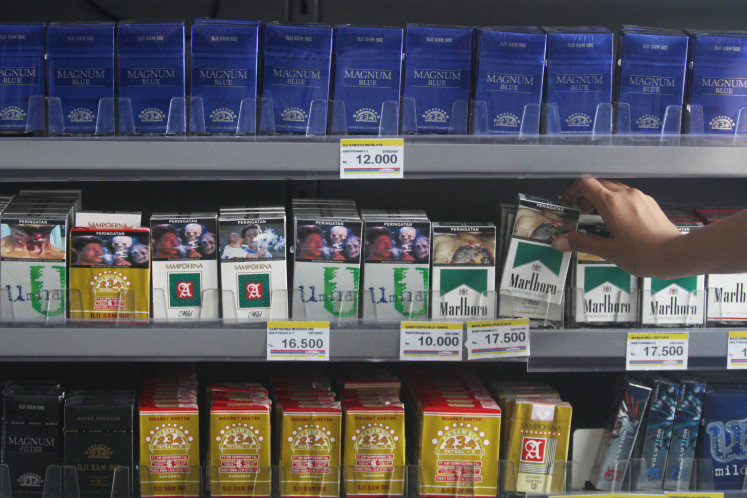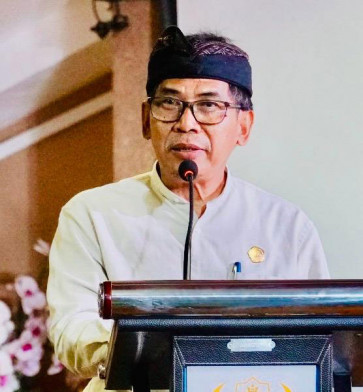Popular Reads
Top Results
Can't find what you're looking for?
View all search resultsPopular Reads
Top Results
Can't find what you're looking for?
View all search resultsSmoke and mirrors: How big tobacco companies hide cigarette ads in plain sight - pt. 1
Change text size
Gift Premium Articles
to Anyone

U
sing social media and influencers, cigarette companies have found an effective way to hawk their products without obviously advertising. This is the first part of a two-part story.
Abdur Arsyad posed for an Instagram photo, staring at his laptop with a pack of cigarettes, a fresh drink and a clean ashtray beside it.
He then began writing the caption for the shot to be posted on his Instagram account @abdurarsyad.
“I’m in love with writing. When I find fresh and inspiring writing, I will read it repeatedly, adoring the ideas and words behind the work,” wrote the stand-up comedian on Jan. 23, 2020.
Five days later, Abdur uploaded an Instagram story.
“Relaxing and reading a book, thinking about bright ideas and imagining them being performed on stage. That is an enjoyable and low-cost activity.”
This time he uploaded a picture of him with a pack of cigarettes and a dirty ashtray. The cigarette pack was of the same brand as before. His followers might not have realized that this was actually part of a new, soft-style cigarette advertising technique that promoted particular brands through the social media presence of famed artists, celebrities and top-tier influencers.
“We’re required to post our daily activities, but the sponsored product must be visible. The captions are in line with the activities, with an additional hashtag from the sponsor,” Abdur said.
Unlike many other product endorsements, which have influencers clearly define the demographics of their followers, noted Abdur, cigarette companies simply ask influencers to make the product visible in every post.
He said there were no instructions for him to specifically target young viewers among his 348,000 followers.

Bad influence?
Data published by Napoleon Cat, a social media analytics company, shows that as of November 2019, 61.6 million Indonesians used Instagram, 47.9 percent of whom were between 13 and 24 years old. According to Statista, another market data firm, in February 2020, 43.6 percent of social media users in the country were between the ages of 13 and 24.
Abdur is one of hundreds of social media influencers who advertise cigarettes clandestinely within their motivational lifestyle content.
In response to stricter regulations on conventional media outlets, big tobacco companies have turned to social media to promote their brands. They typically employ influencers individually, which makes monitoring and data collection difficult. This shift, however, has not meant a decline in conventional advertising.
According to an AC Nielsen survey from 2021, total advertising expenditure on cigarette products for 15 national TV stations, 118 print media outlets, 104 radio stations, 200 top websites and several YouTube channels increased to Rp 9.1 trillion in 2021 from Rp 8.1 trillion in 2020.
The company recorded 519,135 cigarette advertisements placed in 2021, an increase of 66 percent from the 311,934 ads in 2020. The figure excluded advertisements placed on Instagram, TikTok and other social media platforms.
Cigarette companies have remained among the 10 largest advertisers in the country for the past three years.
In 2019, Instagram instated a policy on tobacco advertising and gun control. While the rules apply to the platform’s 93 million Indonesian users, the policy has not been able to curb furtive ads like those on Abdur’s account.
Abdur, like other influencers, does not explicitly promote cigarette products. Instead he posts “daily life” images and videos in which cigarette packs are visible.
Similarly, cigarette advertising on television and in other media outlets has shifted from directly presenting the products to depicting adventurous and exciting activities to associating a perception of coolness with the brands’ logos and other features.

Ineffective regulation
Government regulation No. 109/2012 limits the promotion, advertisement and sponsorship of tobacco products. However, public health experts say the regulation is ineffective, given the profusion of cigarette advertising across all forms of media.
According to the law, tobacco advertisements may only be aired at certain times and in certain contexts to prevent children from being exposed to the material, but huge numbers of young people are exposed to – and influenced by – such advertising nonetheless.
A survey conducted by the Lentera Anak Foundation and Emancipate Indonesia in 2021 found that 99.4 percent of respondents between the ages of 10 and 19 had seen cigarette ads. Around 77.09 percent of the respondents were frequently exposed to cigarette ads, meaning they saw cigarette ads more than once a day.
The survey, involving 180 respondents, was conducted on and offline using random sampling.
A prior study conducted by University of Muhammadiyah professor Hamka in 2007 found that 46.3 percent of teens acknowledged that cigarette advertising was one of the factors that caused them to start smoking.
Nahla Jovial Nisa, program manager at the Lentera Anak Foundation, said the survey revealed a close relation between cigarette advertising tendencies and young people’s cigarette brand preferences.
The survey found that the respondents mostly saw and remembered brands of advertised cigarettes: Sampoerna (40 percent), Djarum (26 percent), Gudang Garam (23 percent) and Bentoel (11 percent).
Meanwhile, in the 2020 Report, PT Hanjaya Mandala Sampoerna stated that the company committed to ensure that marketing and sales of their products were aimed at adult consumers. Indonesia’s largest cigarette company also claimed to implement a responsible marketing and sales strategy.
“We are marketing and selling tobacco products only to adult smokers. We are not intending to lure non-adult smokers nor young people,” the report stated.
The company also reminded consumers of the health impacts of tobacco consumption. “We incorporate pictorial health warnings on every product sold and promoted as stipulated in the regulations,” it said.
Continued to part 2 tomorrow
Guest Editor: Maria Hartiningsih
This article is originally published in Indonesian on Project Multatuli as part of the #TobaccoDeadlock report series to examine why discussions and policies on tobacco control often fail. The series is supported by the Association of Indonesian Public Health Experts (IAKMI).
Translated from Indonesian by Rita Widiadana and Ronna Nirmala









